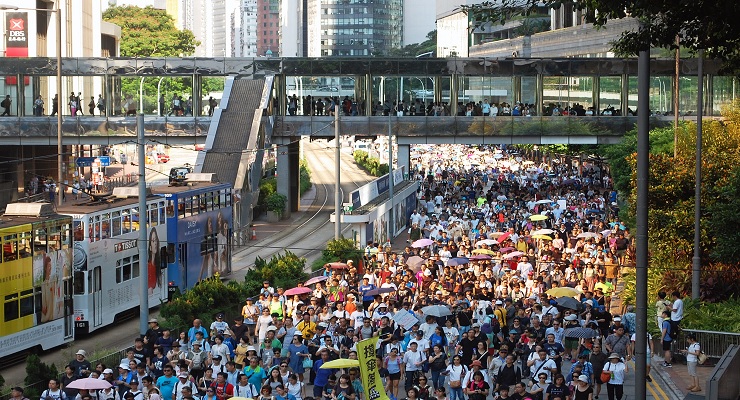
From Human Right Watch regarding Monday trial in Hong Kong where Democracy Chronicles author Benny Tai will face ‘public nuisance’ charges:
Hong Kong authorities should drop charges against nine leaders of the pro-democracy “Umbrella Movement” for non-violent protests in 2014, Human Rights Watch said today. The nine will be tried before a district court on November 19, 2018. The demonstrations took place between September 28 and December 15, 2014. The government’s crackdown and ensuing prosecutions have violated the rights to peaceful assembly and freedoms of association and expression guaranteed under the International Covenant on Civil and Political Rights (ICCPR), which applies in Hong Kong.
“These nine people did nothing but peacefully press the Hong Kong government to fulfill its obligation to deliver genuine democracy to people in the territory,” said Sophie Richardson, China director. “These prosecutions raise further questions about Hong Kong authorities’ moves to politicize the courts.”
The defendants are Umbrella Movement co-founders Benny Tai, Chan Kin-man, and Rev. Chu Yiu-ming; Tanya Chan and Shiu Ka-chun, both lawmakers; Raphael Wong, a political activist; Tommy Cheung and Eason Chung, former student leaders; and Lee Wing-tat, a former lawmaker. They face various criminal charges, including “incitement to commit public nuisance” and “incitement to incite public nuisance.” The three co-founders face an additional charge of “conspiracy to commit a public nuisance.” The nine each face a maximum sentence of seven years in prison.
About 200 demonstrators have been prosecuted for participation in the Umbrella Movement, and dozens were convicted and sentenced on various charges, including unlawful assembly, possession of offensive weapon, and common assault. Three student leaders – Joshua Wong, Alex Chow, and Nathan Law – were also convicted and sentenced for unlawful assembly and incitement in 2016 for leading a non-violent sit-in that culminated in the Umbrella Movement. Chow was given a three-weeks sentence with a one-year suspension while Wong and Law were given community service orders of 80 hours and 120 hours, respectively.
Since the Umbrella Movement, the Hong Kong and Chinese governments have increasingly restricted civil liberties and marginalized those who were involved in the protests.
Beginning in 2016, Hong Kong authorities have removed a half-dozen elected legislators or disqualified candidates from running for seats on Hong Kong’s Legislative Council (LegCo). They were removed for promoting Hong Kong independence or “self-determination” on the grounds that advocating such ideas is “inconsistent” with the Basic Law, the territory’s functional constitution. In an unprecedented move, the Hong Kong government banned a political party – the pro-independence Hong Kong National Party (HKNP) in September – as a “preventive measure” to remove “a real threat to national security.”
Politically motivated prosecutions of pro-democracy leaders have increased, including against elected legislators for their peaceful expression in the LegCo, Human Rights Watch said. There are also reports of harassment by mainland authorities of members of pro-democracy parties and their family members.
The “one country, two systems” arrangement, in which the Hong Kong government is by law guaranteed “a high degree of autonomy” over all issues other than foreign affairs and defense, appears increasingly frail. In March, the Umbrella Movement co-founder, Benny Tai, an academic, faced an orchestrated rhetorical attack by Hong Kong and mainland authorities. The mainland authorities equated Tai’s hypothetical discussion of Hong Kong independence as “a threat to national security.”
In August, Chinese Foreign Affairs Ministry officials told the Hong Kong Foreign Correspondents’ Club to cancel a talk by Andy Chan, head of the HKNP. After the club refused, Hong Kong authorities rejected, without explanation, its vice-president’s application to renew his work visa. Hong Kong is also introducing a national anthem law to bring criminal charges with penalties of up to three years in prison for anyone who “insults” the Chinese national anthem.
“Hong Kong authorities are increasingly silencing debate about the territory’s political realities and future,” Richardson said. “Everyone invested in the rule of law in Hong Kong should press the government to drop the case against the Umbrella Movement’s leaders.”
Leave a Reply